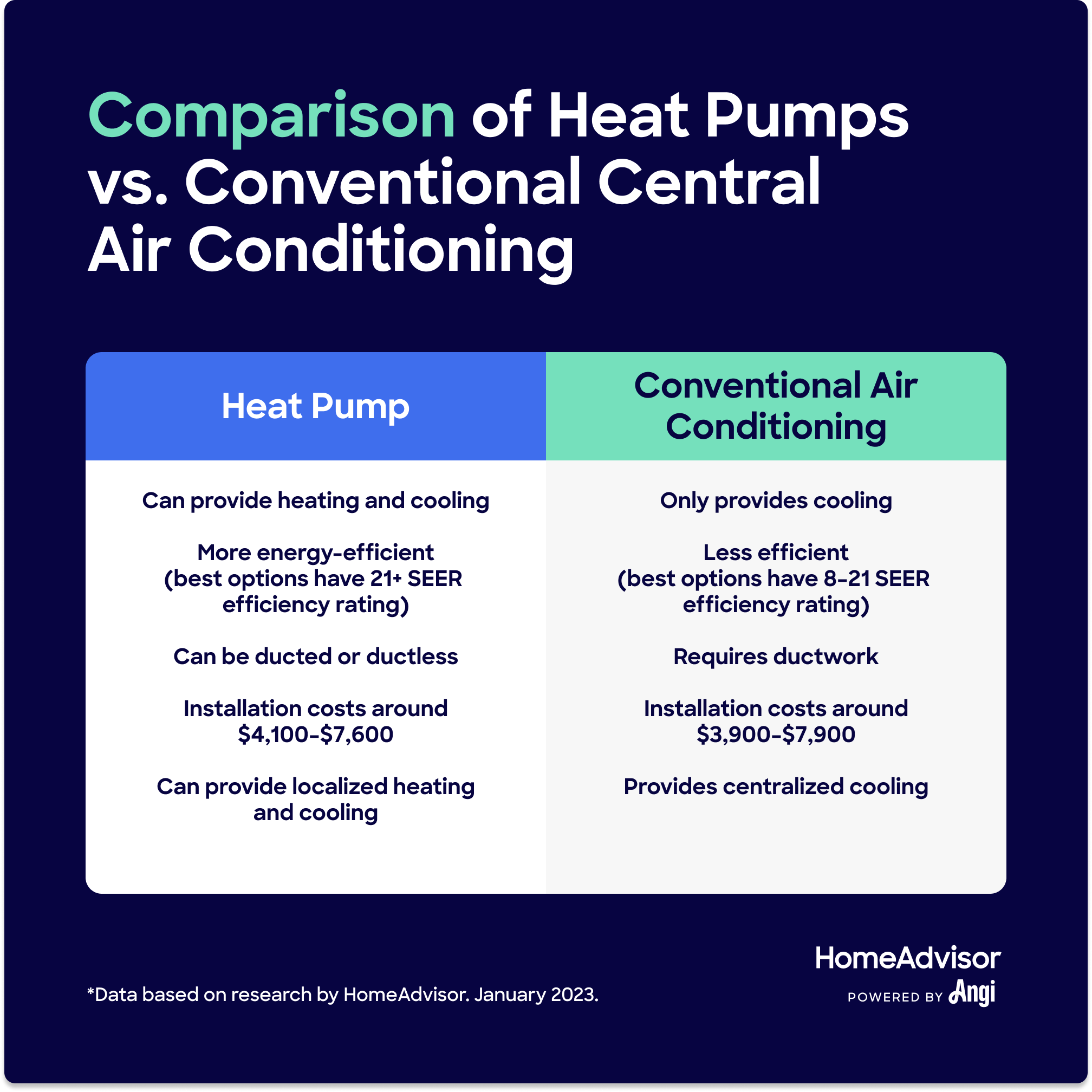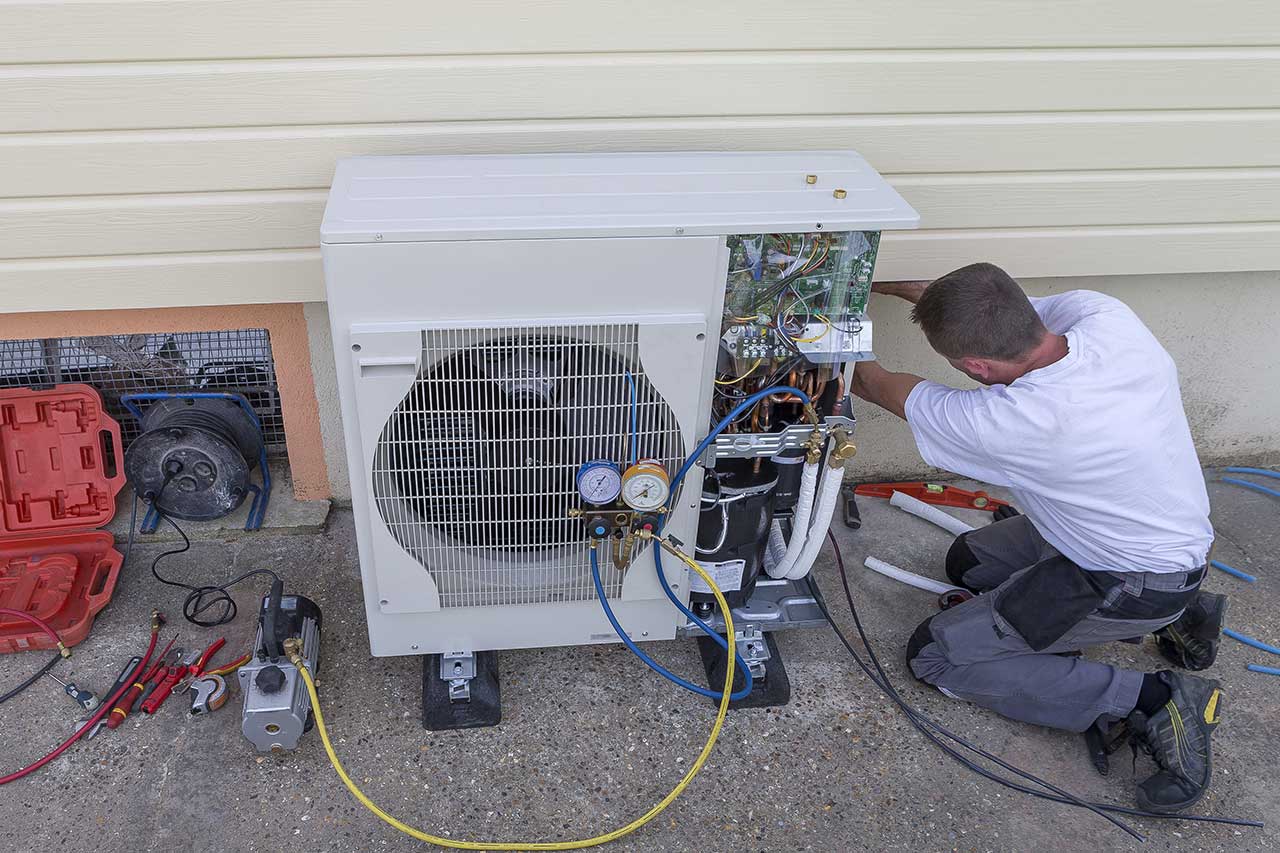How Much Does Heat Pump Repair Cost?
Typical Range:
$161 - $660
Typical Range:
$161 - $660
Cost data is based on actual project costs as reported by 3,947 HomeAdvisor members. Embed this data
.
.
.
.
.
.
.
.
.
.
.
.
.
.
.
.
.
.
.
.
.
.
.
.
.
.
.
.
.
.
•
•
•
•
Updated January 23, 2023
Written by HomeAdvisor.Heat pump repairs cost between $161 and $660, depending on the type you have and the extent of the damage. The average cost is $409. However, you could also pay as little as $100 for minor work like recharging the refrigerant or as much as $5,000 if you need to replace a major component, like paying for a heat pump compressor cost. Most heat pump repair pros charge a minimum trip fee, usually equal to the first hour or two of work, or $75 to $150.
Let's calculate cost data for you. Where are you located?
Where are you located?
| National Average | $409 |
| Typical Range | $161 - $660 |
| Low End - High End | $69 - $2,500 |
Cost data is based on actual project costs as reported by 3,947 HomeAdvisor members.
Heat repair costs vary depending on the type of problem. Common problems include the heat pump not heating or cooling a home sufficiently, not turning on, and not defrosting. Here’s how much each issue costs to fix.
Thermostat repairs cost between $100 and $300 on average. If your heat pump isn’t heating or cooling your home properly, check first to see that the thermostat is actually set to the temperature of your choice before you call for help. If everything checks out, there could be issues with the thermostat’s wiring, or the thermostat itself might be faulty.
Fixing faulty thermostat wiring costs about $100–$200 for labor and materials.
New thermostat prices range from $110–$500+ depending on the type and features.
Labor costs to install the new thermostat range from $80–$200.
Apart from a faulty thermostat and wiring, other issues that could cause your heat pump not to heat or cool your home correctly include clogged air filters, a refrigerant leak, a blocked outside unit (because of snow or debris), or leaking ducts. Hire a licensed and experienced HVAC contractor to inspect and diagnose the exact cause of the issue.
Fixing a heat pump that won't turn on costs between $150 and $400 on average. Some causes of a heat pump not turning on include a faulty thermostat, broken breaker, or fan switch. You may need to replace more than one of these components, increasing the overall cost.
Repairing a heat pump that won’t defrost costs between $90 and $650. The most common causes of a heat pump not defrosting are a faulty defrost timer or broken reversing valve, which is responsible for switching the heat pump from heat mode to air conditioning mode to defrost the ice on the outside unit.
Heat pump repair costs can also vary depending on the part of the system that needs repair. For example, apart from the thermostat, many issues with your heat pump stem from defects with the condenser or your home’s ductwork. Read below to get the average repair costs for these components.
A condenser replacement costs between $300 and $5,000. This part of your heat pump condenses the refrigerant, giving off heat that warms your home. Sometimes, the issue with a condenser might be limited to a specific part of your heat pump, in which case you may only need to hire a technician to repair or replace the part without having to replace the whole condenser.
| Repair Type | Average Cost to Repair or Replace (All-In) |
|---|---|
| Exterior obstructions or blockages | $75 – $200 |
| Refrigerant | $100 – $350 |
| Capacitor | $150 – $250 |
| Line drier | $150 – $300 |
| Condenser fan blade | $150 – $400 |
| Defrost control board | $200 – $650 |
| Condenser fan motor | $250 – $650 |
| Condenser coil | $650 – $1,500 |
| Compressor | $800 – $3,500 |
Repairing ductwork costs between $200 and $700 on average, but you could pay as much as $2,000 for it. The exact price depends on the extent of repairs, but it’s typically less costly than replacing the entire unit, which can cost up to $4,700.
Common ductwork-related problems include poor airflow, condensation, and odd noises. These problems tend to result from the following:
Leaks
Poor installation
Wrong size
Bad connections
Heat pumps are categorized according to the source of energy used, with the four most common types being air source, ductless mini split, geothermal, and water source. Here’s how much you can expect to pay for each type, depending on the extent of the damage.
| Heat Pump Type | Average Cost Range for Repair |
|---|---|
| Air source traditional | $200 – $1,600 |
| Ductless mini split | $100 – $1,500 |
| Geothermal | $200 – $2,000 |
| Water source | $200 – $1,800 |
Air source heat pumps, which cost between $200 and $1,600, are the most common type of heat pump. It works by pulling heat from the air. They work better in temperate climates, where there are fewer temperature extremes. In extreme areas, they’re often used with a backup heat source, like a wood stove or baseboard heat.
Advantages: Low installation costs and easy access to repairs
Limitations: Not the best choice for extreme climates
Mini split systems, a type of ductless air source heating and cooling system, cost between $100 and $1,500 to repair. They consist of two main components: a condenser/compressor unit located outside and an air handler located indoors. These heat pumps work well in buildings or homes that don't have a duct system and where installing one isn't practical.
You can install multiple air handlers in different rooms using a single compressor/condenser to provide localized heating or air conditioning. Installing a ductless heat pump costs between $1,300 and $8,000 on average, which is higher than the cost of installing a traditional air source unit.
Advantages: Energy-efficient and compatible with homes without ductwork
Limitations: Higher than normal installation costs and doesn’t work well in extreme climates
Geothermal heat pumps cost approximately $200 to $2,000 to repair. These pumps rely on the naturally occurring heat generated by the earth, which means low environmental impact.
Geothermal pumps can be expensive to install. A complete geothermal heat pump system costs between $12,000 and $38,000. However, since they have a relatively long life span of around 20-plus years, high energy efficiency, and low operating costs due to the consistency of below-ground temperatures throughout the year, they can be cost-effective in the long run.
The pumps are also great for all climates, with options for different soil types and locations.
Advantages: Compatibility with extreme climates and high energy efficiency
Limitations: High installation costs and difficult to access for repairs
Water source unit repairs cost between $200 and $1,800. This type of pump uses a body of water—like a lake, pond, or well—as a heat source or heat dump. In winter, the heat pump draws water from a network of pipes laid at the bottom of the lake, pond, or well. The heat pump then extracts heat from the water to heat the inside of the home before cycling the water back through the pipes. During summer, the heat pump extracts heat from inside the home, cycles it through the pumps, and dumps it into the water source or body.
Water-source heat pumps are more costly to install but less expensive to operate. They’re the least common type because many people lack access to a nearby body of water or local regulations stop them from using a nearby water source.
Advantages: Low operating costs and high energy efficiency
Limitations: High installation costs and often not an option for people located in landlocked areas
While it's possible to do some minor heat pump repairs yourself, like replacing a wireless thermostat, this is generally a job best left to professionals. Heat pumps are relatively complex pieces of equipment, and some repairs might require special training and tools.
Attempting a DIY repair, especially if you don't have any experience, could cost you if you damage your unit while doing it. Contact a local heat pump repair technician to ensure the job is done safely and correctly.
Heat pumps pull heat from an outdoor source (the air, the ground, or a body of water) through refrigerants to warm your home. They can also keep your home cool in the summer by pushing warm air outside if you have a two-way heat pump system. Unlike other heating systems, a heat pump doesn't generate heat; it just moves it.
There are four maincomponents of a heat pump:
Evaporator: The heat is absorbed from outside into a low-pressure, liquid-state refrigerant. The refrigerant rapidly heats up and changes to a vapor.
Compressor: This pressurizes the refrigerant (now in a vapor state), causing it to rise in temperature.
Condenser: This cools the refrigerant, releasing the heat into the surrounding environment. As the gaseous refrigerant cools, it condenses into a liquid.
Expansion valve: This reduces the pressure of the cooled refrigerant and carries it back to the evaporator for the heating process to repeat.
Replacing a heat pump costs between $4,200 and $7,600. The actual cost depends on the type of heat pump. Geothermal models are typically the most expensive to replace, with the price of the unit plus labor ranging between $6,000 and $20,000. Air source models cost between $4,500 and $8,000 to replace, while the replacement costs for a mini split unit run between $1,300 and $8,000.
The primary alternatives to a heat pump include an attic fan, an electric baseboard heater, radiant heating, and a traditional furnace.
Attic fan installation costs are affordable and effective for homes in moderate climates that only need a small amount of cooling in the summer.
Electric baseboard heaters are a good option for small spaces and homes without a gas line.
Radiant heating systems are less expensive than heat pumps and designed for homes that don't experience harsh winters.
Traditional furnaces are less costly to install but far less efficient and cost-effective to run.
The average heat pump is designed to last about 14 years, roughly the same as a central air conditioning system (12 to 15 years). Newer models can last 20 years or more. How long your heat pump lasts depends on how frequently you use it and whether you perform routine maintenance. An annual heat pump tune-up costs between $75 and $200.
Some of the qualities to look for in a heat pump repair provider are professionalism, accessibility, and plenty of customer references. Your provider should have several years of industry experience, familiarity with all three types of pumps, and replacement parts ready. Shop around and compare multiple heat pump repair companies to find the best option for your needs and budget.

